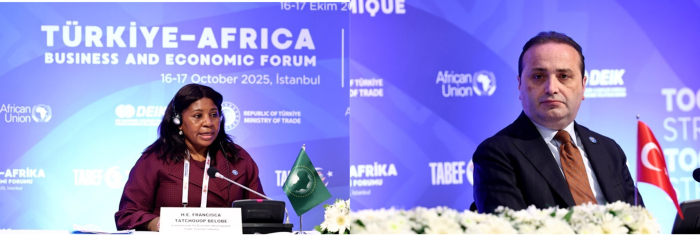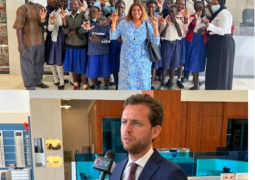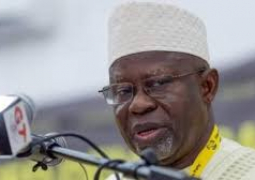
The African Union Commissioner for Economic Development, Trade, Industry and Mining has spoken about the rise in trade volume between Turkey-Africa since 2023, saying the two regions are ready to boost direct foreign investment targeting US$40 billion in 2025 in line with the AU 2063 Strategical Framework.
Mrs. Francisca Tatchouop Belobe who speaking on Thursday during the Ministerial Meeting at the fifth Türkiye-Africa Business and Economic Forum (TABEF) gets underway in Istanbul, Turkey.
She first extended appreciation to the Government of the Republic of Turkey, in particular to His Excellency, President Recep Tayyip Erdogan, for the continued support of the Turkey-Africa Cooperation.
She equally thanked the Ministry of Trade and of the Republic of Turkey for their strong coordination and warm hospitality and for this timely dialogue in a global shifting context.
Commissioner Belobe acknowledged that the global economic landscape is undergoing significant stress due to inflationary pressures, disrupted supply chains, climate shocks, and increasingly geopolitical tensions.
This development, she added, requires stronger, more resilient partnerships, and they require to build on shared values in co-investment.
“In this regard, Turkey and Africa are not starting from zero, we are building on a strong and evolving foundation. This is the fifth forum in this direction. We want to have progress that we have not had in the last four Africa-Turkey economic forums.”
She talked about manufacturing and agro-processing, digital and health innovation, women and youth, infrastructure development as some of the areas identified, noting that the move is in line with the implementation of African Continental Free Trade Area.
“Well, since 2023, we have seen Turkey-Africa trade volume rise. We want to see it rise again more. We have seen greater engagement in energy, in health, and logistic sectors, as well as an increased alignment between our economic priorities and investment. Today, in 2025, not only are we fulfilling those commitments, we are calling them, adapting them, and ensuring them in a rapidly changing world.”
AU Commissioner Belobe also pointed out that the two regions expect more trade and investment frameworks, including through the AFCTA, while promoting regional integration as a foundation for resilient and inclusive growth.
Therefore, the forum, she added, demonstrates clearly that the 30-Year Turkey- Africa partnership is not only a transactional, but it is also a transformational.
“We are moving from mere bilateral investment to a co-developing ecosystem of innovation, production, and sustainability. As we look ahead to 2027 and beyond, we are ambitious for the business-to-business platforms.”
She also calls for more Public-Private-Partnership (PPP) business to the highest it can push, while prioritising more on developing business to business mechanisms within the continent and at the bilateral level.
The African Union Commission, she went on, stands ready to continue backing and promoting the Africa Partnership in order to transform this vision into a reality that benefits our people.
Also speaking, Omer Bolat, Turkish Minister of Trade, who also serves as co-Chair of the Ministerial Meeting, outlined that the cooperation between Türkiye and Africa offers strategic opportunities in the areas of food security, textiles and healthcare.
Minister Bolat also acknowledged that today, one of the greatest threats facing us all is the issue of food security.
“Particularly in Sub-Saharan Africa, where the population is expected to double by 2050 to reach nearly two billion people, the continent’s food security challenge is becoming increasingly urgent. This shows that Africa will be among the regions most affected by this growing crisis.”
He recalled that during the Russia–Ukraine War, a serious food security problem emerged—especially concerning grain and oilseed supplies.
He noted that thanks to Türkiye’s diplomatic efforts through the United Nations, the Black Sea Grain Corridor Agreement was established, making it possible to meet the needs of many African countries.
“In addition, climate change, drought, and extreme weather events pose serious threats to agricultural production—not only in Africa but also in Türkiye and around the world. By combining Türkiye’s technological and agricultural capacity with Africa’s vast arable lands and rising food demand, we must work together to develop sustainable solutions.”
Another critical area of strategic importance that Turkey is venturing into is the textile and ready-made clothing sector.
Textiles, he added, represent one of the industrial fields with the highest potential for added value between Türkiye and Africa.
Meanwhile, this international forum, which attracted ministers, business leaders and entrepreneurs from across Africa, offers leading public and private sector representatives the opportunity to discuss and jointly identify recommendations aimed at increasing private sector engagement for inclusive growth and sustainable development.





